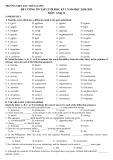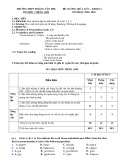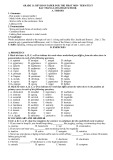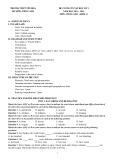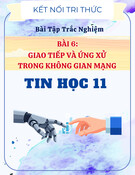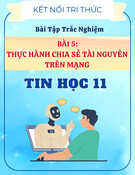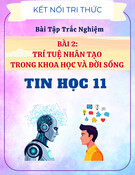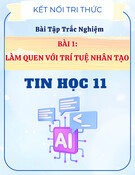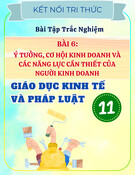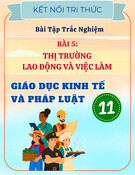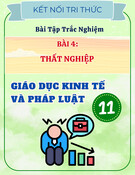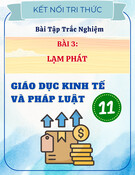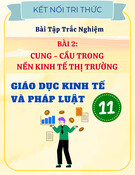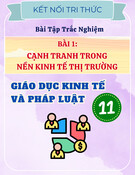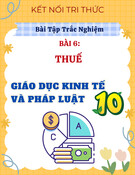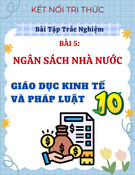
1
TRƯỜNG THPT NGUYỄN BỈNH KHIÊM
TỔ: TIẾNG ANH
ĐỀ CƯƠNG ÔN TẬP MÔN TIẾNG ANH 11 - BRIGHT
GIỮA HỌC KỲ I, NĂM HỌC 2024 -2025
I. LISTENING
Nghe các chủ điểm: Unit 1 (Generation gap and Independent life) và Unit 2 (Vietnam and ASEAN);
II. LANGUAGE
1. Pronunciation:
- Phát âm: /tʃ/, /ʃ/; “-ed ending”
- Dấu nhấn với từ 2, 3 âm tiết.
2. Vocabulary:
- Ôn tập các từ vựng thuộc các đơn vị bài học Unit 1 (Generation gap and Independent life) và Unit 2
(Vietnam and ASEAN);
- Phrasal verbs: carry on, carry out, take off, take away. get along with …
3. Grammar:
- Ôn tập các chủ điểm ngữ pháp Unit 1 + Unit 2: Present simple, Present continuous, Past simple, Past
continuous, Stative verbs, Dynamic verbs, Cleft sentences.
III. READING
1. Cloze - text
Đọc và chọn ngữ liệu phù hợp để hoàn thành mẫu quảng cáo ngắn (80-100 từ) liên quan đến chủ đề
“Vietnam and ASEAN”
2. Reading comprehension: Đọc một văn bản có độ dài khoảng 200-230 từ, xoay quanh các chủ điểm
thuộc Unit 1, 2.
3. Sentence arrangement ( sắp xếp câu)
Đọc và sắp xếp các câu văn, cụm từ đã cho thành một lá thư hoặc email hoàn chỉnh.
IV. WRITING.
1. Sentence building: Sắp xếp từ / cụm từ để tạo thành câu hoàn chỉnh (Thì hiện tại tiếp diễn/ động từ
trạng thái)
2. Sentence transformation
+ Simple past / Past continuous với WHILE
+ Cleft sentences
3. Writing email/letter:
+ Write an informal letter describing a problem that you have with your parents or your family members

2
REVISION FOR THE FIRST MID- TERM TEST
Grade 11
UNIT 1 GENERATION GAP|
I/ PRONUNCIATION
A. Choose the word whose underlined part differs from the other three in pronunciation in each of the
following questions.
1. A. parent B. family C. planet D. fashion
2. A. question B. suggestion C. picture D. generation
B. Choose the word that differs from the other three in the position of the main stress in each of the
following questions.
3. A. attitude B. performance C. difficult D. powerless
4. A. people B. advice C. daughter D. problem
II/ VOCABULARY AND GRAMMAR
A. Choose the best option (A, B, C or D) to complete each of the following questions.
5. Despite her problems, she carried _________ working as usual.
A. out B. in C. on D. up
6. Now that my sons are more ______________, I have more time for myself.
A. strict B. easy-going C. worried D. independent
7. My sister is very _____________; you feel that you can really open up to her and tell her about your
feelings.
A. responsible B. understanding C. easy-going D. outgoing
8. Teenagers often complain __________ not having enough pocket money.
A. about B. with C. on D. over
9. What are you doing? It ________ like something is burning.
A. is smelling B. smelled C. smells D. was smelling
10. Jim is very untidy. He ______________ his things all over the place.
A. will always leave B. is always leaving C. always left D. has always left
11. My cousin hasn't found a flat yet, so he _______________ his parents.
A. still lives B. has lived C. will live D. is still living
12. I always ______________ happy when the sun is shining.
A. fall B. feel C. think D. see
B. Mark the letter A, B, C or D on your answer sheet to indicate the word or phrase that is CLOSEST
in meaning to the underlined part in each of the following questions.
13. Several parents can't get along with their child when he or she enters teenage years.
A. have a good relationship B. have a bad relationship
C. have problems D. have good memories
14. Some teenagers feel that their parents are so old-fashioned that they can't understand the latest fashion
trends.
A. modern B. difficult C. traditional D. powerless
C. Mark the letter A, B, C or D on your answer sheet to indicate the word or phrase that is OPPOSITE
in meaning to the underlined part in each of the following questions.
15. Mr Jones is a very strict teacher, especially about homework.
A. easy-care B. easy-going C. outgoing D. understanding
16. He may become a selfish and spoiled child if his parents keep giving him everything he asks for.
A. careless B. careful C. thoughtful D. useful
III/ ERROR CORRECTION
Find the underlined part that needs correction in each of the following questions.
17. The food that Mark is cooking in the kitchen is smelling good.
A B C D
18. Nothing could be more important for me than my family.
A B C D

3
19. What should parents do if their children are so stressing about their grades?
A B C D
20. Hana looked happily when her friends threw her a surprise party on her birthday.
A B C D
IV/ WORD FORM
Write the correct form of the given words.
21. Her _____________ behaviour cost her father many sleepless nights. (RESPONSIBILITY)
22. Don't suddenly take up violent exercise after years of ___________. (ACT)
23. Teenagers get into ______________ with their parents usually because they don't understand one
another. (ARGUE)
24. The teacher told us that Tony is a ____________ and hard-working student. (RELY)
V/ READING
Read the text and choose the best answer (A, B, C or D) for each question.
The balance between freedom and control
Parents must decide how independent to let their children be as they grow up. At what age should they stop
being with their children at all times? When should they stop knowing exactly where a child is at every
minute of the day?
According to Ellen French, a scientist who studies children’s behaviour, ‘Parents are responsible for the
safety of their children, so when they are very young, even careful children should not go alone to places.
Something bad might happen on the journey or when they arrive. You cannot expect a child of six or seven to
always make good decisions. However, it is also true that too much control has a bad effect on the ability of
an older child to make good decisions. If your parents decide almost everything for you at 14 or 15, how can
you learn what is a good decision and what is a bad one?’
Ellen points out that serious arguments will often happen if the behaviour of parents suddenly changes when
a child becomes a teenager. If, for example, a child of 11 or 12 is allowed to play outside, far from the family
home, for hours and hours, it is hard to suddenly say to a 13-year-old, ‘You cannot go and meet your friends
downtown in the early evening.’ This change of behaviour is likely to cause problems in the family.
Ellen says, ‘The key things are trust and respect on both sides. Once parents show they trust their teenagers,
those teenagers will, in turn, respect the rules which their parents make and believe they are fair, even if the
reasons are not fully understood.’
25. What does the word When mean in the first paragraph?
A. At what time of the year.
B. At what time of the day.
C. At what age.
D. On what day of the week.
26. According to Ellen French, why should parents not let a six- or seven-year-old go anywhere alone?
A. Because most places are not safe for a very young child.
B. Because very young children always make bad decisions.
C. Because very young children do not behave carefully.
D. Because you cannot be 100% sure of the child’s safety.
27. According to Ellen, what should parents do with their teenage children?
A. Carry on controlling most of their behaviour.
B. Allow them to make most of the decisions in their lives.
C. Teach them how to make good decisions.
D. Give them chances to make responsible choices.
28. What mistake is Ellen writing about paragraph 3?
A. Parents not changing their behaviour towards teenagers.
B. Parents changing their behaviour when their children become teenagers.
C. Parents not letting their teenagers go out alone.
D. Parents letting their teenagers go out alone.
29. What does the word they mean in the last sentence?
A. Rules. B. Parents. C. Teenagers. D. Parents and teenagers.

4
UNIT 2 | VIETNAM AND ASIAN
I/ PRONUNCIATION
A. Choose the word whose underlined part differs from the other three in pronunciation in each of the
following questions.
1. A. walked B. stopped C. rushed D. owned
2. A. surrounded B. showed C. confused D. enjoyed
B. Choose the word that differs from the other three in the position of the main stress in each of the
following questions.
3. A. century B. pagoda C. museum D. cathedral
4. A. favour B. locate C. visit D. worship
II/ VOCABULARY AND GRAMMAR
A. Choose the best option (A, B, C or D) to complete each of the following questions.
5. The scenery of Ha Long Bay was so beautiful that it took my breath ________.
A. off B. out C. up D. away
6. When they opened up the ________, they found treasure beyond their wildest dreams.
A. cathedral B. palace C. tomb D. citadel
7. One Pillar Pagoda is not only a popular place of ________ but also a symbol of Ha Noi.
A. worship B. hole C. bridge D. gap
8. They camped at the base of the _________ before attempting to climb it.
A. valley B. waterfall C. mountain D. cave
9. It was the trekking tour through Cuc Phuong National Park ________.
A. which enjoyed the most B. that he enjoyed the most
C. he enjoyed the most D. where he enjoyed the most
10. I ordered a drink while I _____________ for Brad to arrive.
A. am waiting B. waited C. was waiting D. wait
11. He ____________ a lot of photos in order to memorize the amazing view.
A. gave B. made C. had D. took
12. When I was a child, I often ______ fishing and camping with my father every weekend.
A. would go B. went C. had gone D. was going
B. Mark the letter A, B, C or D on your answer sheet to indicate the word or phrase that is CLOSEST
in meaning to the underlined part in each of the following questions.
13. Our plane to Ho Chi Minh City didn't take off on time due to bad weather.
A. leave the ground B. go on runway C. arrive D. land
14. It's a good idea to learn about the etiquette of a country before you visit it.
A. basic laws B. polite behavior C. culture D. greetings
C. Mark the letter A, B, C or D on your answer sheet to indicate the word or phrase that is OPPOSITE
in meaning to the underlined part in each of the following questions.
15. He decided to have a holiday in the countryside as an escape from the crowded city.
A. unfilled B. deserted C. blank D. full
16. Hana spent the whole afternoon exploring the narrow market streets of the ancient town.
A. tight B. endless C. long D. broad
III/ ERROR CORRECTION
Find the underlined part that needs correction in each of the following questions.
17. It was on Monday when the letter arrived.
A B C D
18. I was looking out of the window and I was seeing him in the street.
A B C D
19. Huế is famous for its traditionally, ancient architecture and poetic beauty.
A B C D
20. Jonny went on a three-days tour in Ninh Binh and learnt a lot about Vietnamese culture and history.

5
A B C D
IV/ WORD FORM
Write the correct form of the given words.
21. We were impressed by the ________________ lantern streets of Hoi An Ancient Town. (PICTURE)
22. Spending several hours in that _______________ meeting was a total waste of the work day. (IMPORTANCE)
23. It's worth visiting the Temple of Literature, which is an important ______________ building in Ha Noi.
(HISTORY)
24. The British Museum is one of London’s most popular tourist _______________. (ATTRACT)
WRITING
A. Put the words in the correct order to make correct sentences.
1. Anna lost her purse during her stay at the Old Quarter. (WHILE)
2. ASEAN was founded in 1967.
It _____________________________________________________________
3: He phoned me during my dinner.
→ While I _________________________________________________________________
4: We visited One Pillar Pagoda yesterday. (Emphasize the words in bold)
→ It ______________________________________________________________________
5.She met her close friend during her stay in Nha Trang.
→ While she _______________________________________________________________
6: Lan bought some souvenirs from the Old Quarter. (Emphasize the words in bold)
→ It ______________________________________________________________________
7.Her brother called her during her sleep.
→ While she _______________________________________________________________
8. The Temple of Literature was Vietnam’s first national university. (Emphasize the words in bold)
→ It ____________________________________________________________________
B. Put the words in the correct order to make correct sentences.
1. neighbours / gets / her / always / She / along / well / with / .
_______________________________________________________________
2. James/ hanging/ with/ this weekend./ isn’t/ out/ his friends/
_________________________________________________________________
3. meeting/ my / for / tonight./ I’m/ parents / dinner /
--> _________________________________________________________________
4.Ben / are / a new / in / Ben's bedroom./ and his dad / fitting / desk /
____________________________________________________________________
5. is / an/ exam/ tomorrow./ taking / Harry / English/
______________________________________________________________________

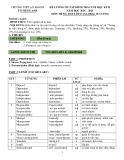
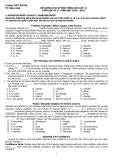
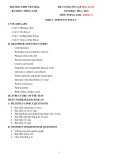
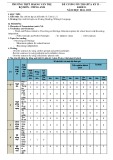
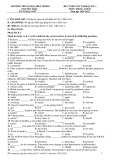
![Đề cương ôn tập học kì 1 Tiếng Anh lớp 11 năm 2024-2025 - Trường THPT Hoàng Văn Thụ Hà Nội [Mới nhất]](https://cdn.tailieu.vn/images/document/thumbnail/2024/20241219/gaupanda066/135x160/2931734603591.jpg)
